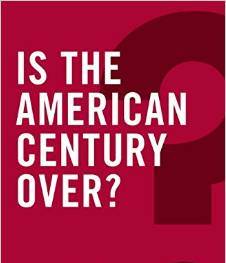Moises Naim reports in The Atlantic about how the the US political dysfunction is doing serious damage to U.S. economic power.
Will the United States remain the most powerful country in the world? Many think not. Those who feel this way also tend to think that China’s ascent will lead to America’s decline. Harvard professor Joseph Nye, who is not a declinist, begins his new book Is the American Century Over? noting that “in recent years, polls showed that in 15 of 22 countries surveyed, most respondents said that China either will replace or has already replaced the United Sates as the world’s leading power.” Its giant landmass and billion-strong population, combined with rapid economic, social, and military progress over the last few decades, make China an obvious candidate to overtake the United States as the primary shaper of world affairs. But the attention in the United States to China and other foreign threats obscures an important fact: America’s diminishment as a world power may be driven as much by the fraying of its domestic politics and chronic institutional gridlock as by the rise of rivals abroad.
Several recent developments reveal how political and institutional fragmentation in the United States has produced self-inflicted wounds for the U.S. abroad. In all of these instances, America’s ability to exercise economic power in the world has been deliberately curtailed through decisions made unilaterally in Washington by American political leaders.
The first development involves the International Monetary Fund (IMF). As the global economy becomes more interdependent, the need grows for a supranational institution capable of detecting looming financial crises and containing the spread of these crashes when they occur. Countries that get in economic trouble also need a lender of last resort to help them regain stability and undertake often-unpopular economic reforms. The IMF’s record on these matters is far from stellar; it has, for instance, failed to anticipate crises and gone too far in imposing harsh conditions on its beleaguered borrowing countries. Critics around the world denounce the IMF as an opaque organization that perpetuates America’s economic preeminence; in the United States, it is mostly ignored or seen as another UN-like bureaucracy that feeds on American taxpayers. These critiques often exaggerate the institution’s indisputable flaws and overlook or dismiss the instances in which it has provided an indispensable public service. The challenge for U.S. officials is to ignore populist calls to shut the IMF down and instead find ways to make it work better.
In fact, that’s precisely what the United States tried to do in 2010 with a series of reforms aimed at updating the World War II-era institution for the 21st century. Among other changes, the Obama administration proposed raising China’s voting shares in the IMF’s board from 3.8 percent to 6 percent of the total. The adjustment doesn’t even reflect the fact that the Asian superpower will soon have the largest economy in the world and that China’s share will remain well below America’s 16.7 percent of votes, which gives the U.S. several advantages, including the ability to veto IMF decisions it dislikes. The administration’s reforms also included increasing the nearly negligible weight that emerging economies like Brazil and India now have in the IMF—despite accounting for half of the world economy—by altering the composition of the institution’s board of directors. That board still reflects the world order of 1944 and affords Europe representation that is disproportionate to its current influence (seven of 24 board members are European). The board unanimously approved all the proposals.
